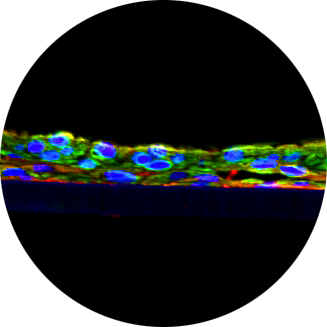ROSCOVITINE INHIBITS DIFFERENTIATION AND INVASION IN A THREE-DIMENSIONAL SKIN RECONSTRUCTION MODEL OF METASTATIC MELANOMA.
- TR Number: 455
- Authors: Mohapatra1, S., Coppola1, D., Riker2, A.I., and Pledger1, W.J. 1Department of Interdisciplinary Oncology, H. Lee Moffitt Cancer Center and Research Institute and the University of South Florida Medical Center, Tampa, Florida, 2University of South Alabama-Mitchell Cancer Institute, Mobile, Alabama.
- Materials Tested: DMSO (Dimethyl sulfoxide), Roscovitine
This study by researchers at the H. Lee Moffitt Cancer Center and Research Institute, and the Mitchell Cancer Institute (Univ. of South Alabama) demonstrated that the Mattek 3-D Melanoma Tissue Model can be used to investigate the therapeutic potential of drugs designed to help patients with metastatic melanoma – in this study, the drug was the cyclin-dependent kinase inhibitor roscovitine. The goal of this study was to investigate the therapeutic potential of a cyclin-dependent kinase inhibitor, roscovitine, in cultured melanoma cells and a three-dimensional skin reconstruction model of metastatic melanoma (Mattek Corp. 3-D Melanoma Tissue Model). The modulatory effects of roscovitine on the growth and survival of normal melanocytes and cultured melanoma cell lines were tested. Additionally, scientists at H. Lee Moffitt Cancer Center and Research Institute, and the Mitchell Cancer Institute (Univ. of South Alabama) investigated the potential of roscovitine to regulate the growth and differentiation of a metastatic melanoma cell line (A375) in a three-dimensional skin reconstruction culture consisting of A375 cells admixed with normal human keratinocytes embedded within a collagen-constricted fibroblast matrix. Scientists showed that roscovitine is able to induce apoptosis in the melanoma cell lines A375, 888, and 624, but not in normal human cultured epithelial melanocytes. The degree of apoptosis within these cell lines correlated with the accumulation of p53 protein and concomitant reduction of X-linked inhibitor of apoptosis protein, with no change in the proteins Bcl-2 and survivin. Researchers also found that roscovitine inhibited the growth and differentiation of A375 melanoma cells within the dermal layer of the skin. The results of this study show that roscovitine has the potential to inhibit the differentiation and invasion of metastatic melanoma and may be useful as a therapy for the treatment of patients with metastatic melanoma.

